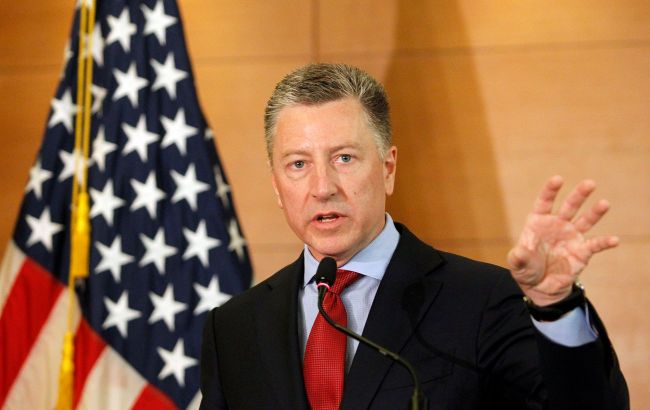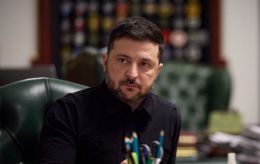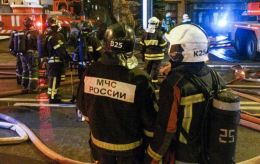Kurt Volker: Trump personally manages foreign policy, Russia-Ukraine war among priorities
 Kurt Volker (photo: Getty images)
Kurt Volker (photo: Getty images)
Kurt Volker, Special Representative of the US Department of State for Ukraine in 2017-2019, spoke about the current state of negotiations to end the war, the specifics of the work of US special envoys, and the next steps of the Trump team to put pressure on Russia in a blitz interview with RBC-Ukraine.
Takeaways
- How should we perceive Trump's change in rhetoric towards Russia?
- What is the place of ending the war among Trump's foreign policy priorities?
- Can the US withdraw from the negotiation process?
Although US President Donald Trump's team is trying to end the Russian-Ukrainian war as soon as possible, peace is still far from being achieved. In particular, because of Putin's position, he does not want the war to end. There are more and more signs that Washington is beginning to realize this.
At least, this is evidenced by the change in the rhetoric of Trump and some members of his team. However, it is still too early to judge significant changes in US policy in the context of increasing pressure on Russia, said Kurt Volker, an American diplomat who has worked as an analyst at the CIA, as well as at the State Department and the US mission to NATO, to RBC-Ukraine.
But most importantly, Kurt Volker was also the US President's representative for Ukraine during Trump's first term. It was through the prism of this experience that he spoke about the challenges facing the current US Special Representative for Ukraine, Keith Kellogg.
— Recently, J.D. Vance stated that Putin is demanding too much at the negotiating table. Trump himself has also clearly shifted his rhetoric. What could this indicate, and might it signal a change in the US strategy toward Russia?
— I would not read too much into anyone's statement. I think that the US approach under Trump has always been to get both sides to agree to end the war. There has been progress with the US and Ukraine calling jointly for a 30-day ceasefire, jointly calling for a full and permanent ceasefire, and that exposes Putin as not willing to do that. And so they're reflecting that frustration now.
But we'll have to see what that turns into. Does that result in new secondary sanctions on Russia? Does it result in the continuation of US military supplies to Ukraine, and under what circumstances? There's a lot that has yet to play out. And I would not rule out that there will be some frustrations with Ukraine in the future.
We saw the last two or three months how that went. You can't rule that out. But it's positive that they recognize that the obstacle to peace here is really Putin.
— Based on your experience as a special representative on Ukraine and Russia, what are the key characteristics of Keith Kellogg’s approach to such work? And what challenges might he face?
— Well, I think the first big challenge that he has is you have a separate special representative for dealing with Russia, which is Steve Witkoff. And making sure that we have one policy, one coordinated set of ideas as to how we deal with this. That's difficult if you have two people doing it. So that's one challenge.
Second, you have to, if you're an American diplomat dealing with this, you have to understand Putin. Who is he? What is he really doing? You don't listen to what he says. You observe what he does, and you interpret why is he saying what he's saying. And the reality is that Putin wants to eliminate Ukraine as a nation. He wants to take over all of the territory, impose his own government, and leave it fully demilitarized and without any Western support.
And even though he may say something else, that's what he's doing. We need to know that. And that means we need to be prepared to prevent that with a variety of means. Building up Ukraine's military capability. Investing in Ukraine's economy. Helping Ukraine redevelop economically. Accelerating Ukraine's integration into Western institutions. And on and on.
There's a lot that we have to do to make that vision of Putin's impossible to realize.
— As of now, where does ending the Russia–Ukraine war stand among Trump’s foreign policy priorities?
— In terms of international priorities for Donald Trump, you have tariffs. You have the southern border. You have the war in the Middle East. And you have Russia's war against Ukraine. I think those are the top four issues that they're paying attention to. And President Trump is obviously dealing with this personally.
Very different from when I was a special representative. He's the guy who's driving the train right now.
— Do you believe the US could actually walk away from negotiations, as Trump and members of his team have suggested?
— Yeah, it's possible. It's clear that Putin is not serious about a ceasefire. Having more and more meetings that are pointless doesn't appeal to anybody. So, yeah, I could see Rubio and Whitkoff and Kellogg just saying, Okay, we're not doing any more meetings like that until Russia is ready to actually have a ceasefire.

